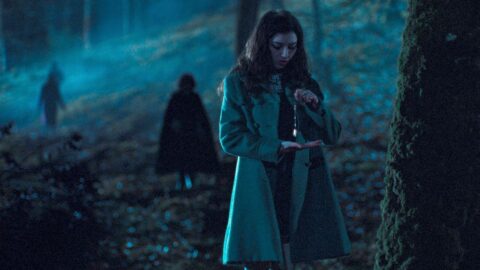Françoise (Léonie Dahan-Lamort) is convinced she’s going to die.
Not in some unspecified moment in the future, like everyone else, but tonight. In a ball of fire. Like Joan of Arc. She knows because she saw it in a dream.
Françoise might come across as a little melodramatic. But she is a boarder at a French boarding school, where one is constantly reminded of fire, brimstone and eternal damnation. She’s also seventeen and a virgin; simultaneously enchanted and repelled by the prospect of sex, a little death in and of itself. Endeavouring to enjoy the last night of her life, she ropes in her best friend Delphine (Lilith Grasmug) to break loose from school and attend a costume party in the countryside.
Evoking the horror aesthetic of Werner Herzog’s Nosferatu the Vampyre (1979), the retro-pleasures of Peter Strickland films, and even the Twilight trilogy, Concorso Cineasti del presente entry Bitten (Romain de Saint-Blanquat, 2023) is a beguiling ode to the doomed romanticism of youth.
Creating a sense of inevitability and foreboding is the presence of a pendulum, first caught in close-up as it swings from left to right, Françoise’s face flashing in the reflection. We never learn how she obtains this mysterious object, but she’s convinced that if it swings clockwise, her wishes (and fears) will be granted. Delphine, herself more experienced in matters of love, tells her it’s nonsense, but joins in on the doomed adventure as an act of solidarity. The question is whether female friendship is enough to quell the fires of suicidal ideation.
Once the story gets into full swing, not a lot actually happens, director Romain de Saint-Blanquat preferring to envelop us into the particular way the forest looks in the early morning, or the way the light falls on Françoise’s face as moonlight creeps through a chapel, or Delphine’s micro-expressions as she passes silent judgement on her impulsive friend. Moments are spared for a melancholic dance, a deep conversation, or even a look between old pals; creating more of a reverie on a theme than traditional narrative-heavy Young Adult films.
Maxime Rohart slots into the Robert Pattison/Klaus Kinski role extremely well, playing a pale-faced, world-weary, century-old vampire with the face of a boy, immediately drawn to Françoise as she vents her frustrations towards both the church and male chauvinism. Offering both an effete, softer masculinity, as well as a twisted mirror/counterpoint to Catholicism’s obsession with blood, their relationship is played with narrative plainness but emotional mystery, Françoise searching through the murk of her own feelings towards a new type of sexual maturity.
The early Joan of Arc reference is telling, because like in the classic Dreyer film, The Passion of Joan of Arc (1928), Bitten is a film about faces. Dahan-Lamort, only 20, provides a masterclass in contrasting emotions, capturing the contradictions of youth; caught between wanting to see it all and being scared of what you might see in the process. Aided by a mellifluous, 60s-evoking score by Emile Sornin, all clavichords, mysterious bells, heavy woodwinds and discordant, jazz harmonies, Bitten presents us with the opportunity to examine various contrasting ideas at once. Playing out in the dim light of the early morning sun, de Saint-Blanquat’s debut shimmers with possibility and tenderness.
Redmond is the editor-in-chief of Journey Into Cinema.
